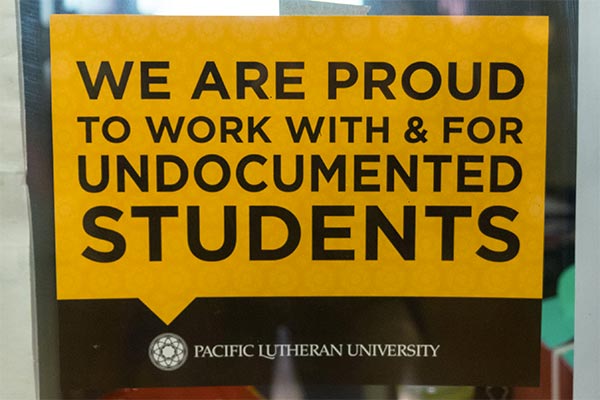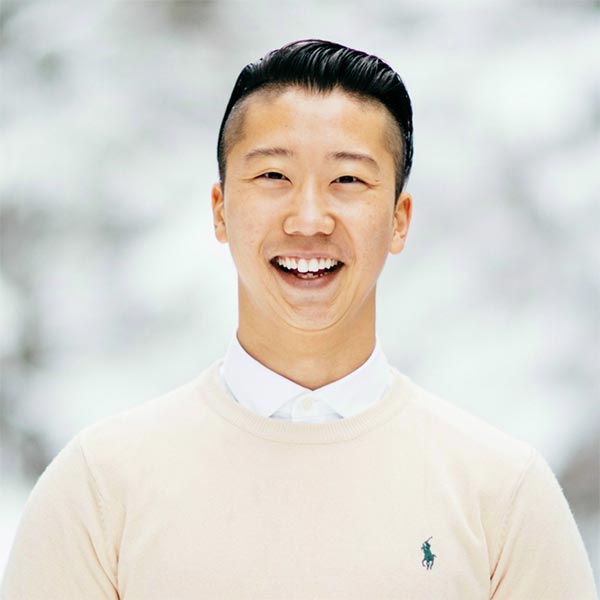“What makes an American an American?”
This is a question Thomas Kim ‘15 thinks about often. As a newly married third-year law student with employment lined up after graduation, an activist philanthropist and an upstanding community member, Kim checks all the “American” boxes.
Except for one: actually being a legal citizen.
Kim is one of the approximately 800,000 Deferred Action for Childhood Arrivals recipients in the United States. DACA grants temporary visas to young people who arrived in the United States with their parents as undocumented immigrants.
While Kim might not be an American legally, he is certainly a Lute. Kim graduated in 2015 with degrees in mathematical economics and psychology and a minor in statistics. Currently, he is in his third year at the Sandra Day O’Connor College of Law School at Arizona State University in Phoenix, AZ.
“PLU really set things well for me,” Kim said.
But the college path was not easy for Kim. His family emigrated from South Korea in 2005 and entered the United States on a year-long visitor visa. His parents bought a dry cleaning business south of Portland, Oregon, and hired a lawyer to help them get green cards. That lawyer cheated Kim and his family, taking their money and chance for legal status. In an article by the The Oregonian, it was discovered that the Kims’ lawyer had been disbarred for violations of professional conduct against many other families like Kim’s.
As a high school student who was well aware of his family’s immigration status and financial capabilities, Kim figured college wasn’t in the cards.
“My post-high school plan was to go to the local community college and go to night school and during the day I would work at a teriyaki restaurant,” Kim said. “Of course getting paid under the table.”
But one of Kim’s high school track friends was going to PLU and told him about the merit-based scholarship opportunities he could qualify for.
So Kim applied and took a Greyhound from Portland for Presidential Scholarships Weekend to interview for one of PLU’s five full-tuition Regents’ Scholarships. He was selected for the prestigious award.
“The interview went well and I was honored that the committee found me deserving of the scholarship,” Kim said. “And I took full advantage of that.”
Four years later, after working 30 hours a week to pay for room and board and leading numerous campus clubs and organizations, Kim left PLU with two majors and one minor.
For as active as Kim was on campus, his immigration status was a well-kept secret. Only a handful of friends and trusted mentors knew that he was an undocumented immigrant, and Kim preferred it that way.
“Because I didn’t want an added lens of when folks interacted with me, and that’s why I learned English so quickly and had as many leadership positions as possible,” Kim said. “I didn’t want anyone to doubt that I was an American.”
When President Obama announced DACA in 2012, Kim remembered exactly how he felt.
“It was exhilarating,” Kim said. “It gave me a new possibility that I could actually stay here, for a little while longer at least, without the fear of getting deported.”
He immediately applied and helped his two brothers and friends apply. He was familiar with government forms from years of doing his parents’ taxes.
“When it came out I applied and that allowed me to be more secure in a way that I was able to more freely talk about who I am,” Kim said. “My history, my story as well as my status.”
Kim is just one of many students who attend PLU with undocumented or DACA status. The official number is not known in an effort to protect the security and privacy of such students.
Administrative efforts to support undocumented students at PLU have been long standing, but in the face of a presidential administration unfriendly to immigrants in the United States, an official task force for PLU’s undocumented students was created. Its mission is to best support the needs of undocumented/DACA students.
The task force is made up of faculty and staff and includes student representatives from the undocumented student organization called The Gold Group. Since their formation in November 2016, the task force has been focusing on financial help for students and outreach to the PLU community.
Like Kim, who could not take out any loans due to his immigration status and had to work his way through school, financial means are of great concern for many undocumented students. The task force partnered with PLU librarians to create a library for all students who cannot afford textbook costs.
“We recognize that access to course materials intersects with undocumented student identities a lot, but it also intersects with so many of our other students on campus,” said Nicole Juliano, Assistant Director of the Diversity Center and task force member.

Task Force working with and for Undocumented Students
The Task Force working with and for Undocumented Students advocates for undocumented students by coordinating campus trainings, connecting the community to on- and off-campus resources, and eliminating barriers to student success.
The task force has also created financial support systems to help cover the cost of DACA renewal, and has set aside two Rieke Fellowships in the Diversity Center.
“With things like this (the Rieke Fellowship) we are embedding in university culture that this is something we want to make sure doesn’t go away,” Juliano said.
Another focus of the task force was to start trainings and workshops for faculty and staff. One result was public posters tacked in office windows across campus, showing commitment to work with and support undocumented students.
“Attendees to the trainings got to learn about terminology, things to do and not to do, hear the stories from the undocumented students themselves and how difficult things are,” said Tamara Williams, director of the Wang Center and professor of Hispanic Studies.
Faculty and staff who are trained and have committed to helping current undocumented/DACA students are listed on the Undocumented Student Resource website. The webpage also includes valuable information for undocumented students, including links to DACA renewable scholarships and support and legal resources.
Even though the task force wasn’t in an official capacity while Kim was at PLU, he had support from his family, his mentors, his friends and his faith.
And Kim has some advice for current undocumented students at PLU.
“Don’t ever settle for a no. If I had settled for a no when my immigration attorney cheated us, I would not be here,” Kim said.
That moment was pivotal for Kim and his goals.
“I was hurt we were hurt and betrayed and disappointed. And I was mad and I was bitter,” said Kim. “And so I figured, I am not the smartest kid in the room, but as long as I don’t cheat I could make a better lawyer than he ever was. And that was when I wanted to become a lawyer who helped families like mine.”
Kim will be working in the business and tax division for Seattle-based law firm Davis Wright Tremaine LLP. He is currently the chair of the Student Law Division of the American Bar Association, representing 120,000-plus law students. He has passed legislation to make the bar exam open to all, including undocumented students, and he has set up a scholarship fund at his old high school that offers aid regardless of immigration status. And he intends to continue helping immigrant families, pro bono.
Kim’s DACA is set to expire next fall, though he has recently married an American and will be making a status shift soon. But many current PLU students are feeling the stress of uncertainty over their status — and the task force is also at an impasse, with future plans dependent on what the United States Congress decides to create for DACA recipients.
In the meantime, PLU community trainings will continue and the task force is dedicating to addressing undocumented student needs. But despite this shaky time, task force members remain hopeful.
“I don’t think that I can allow myself to have anything but hope,” Juliano said.“I feel like it is my job to be able to help a student find hope in these tough times and kind of try to frame it as a lifetime of opportunities and a short time of questions.”
And Kim feels the same way.
“I am hopeful that there will be a meaningful and effective measure from Congress that will allow folks like us to continue to contribute to this economy and continue to contribute to this society,” he said. “And to continue to live the American dream here.”


